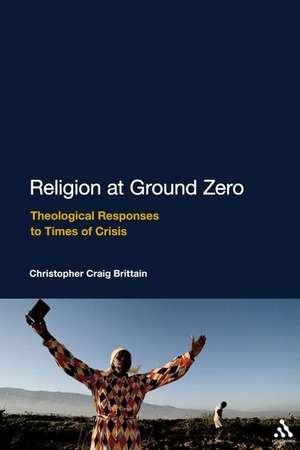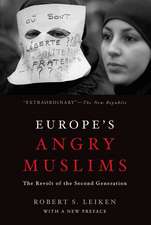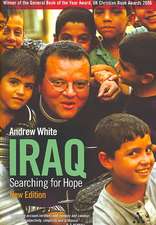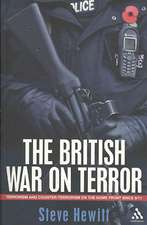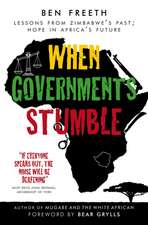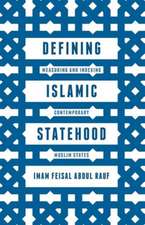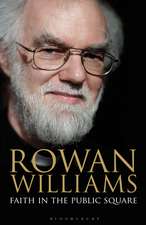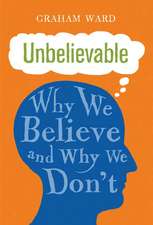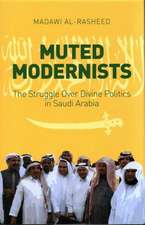Religion at Ground Zero: Theological Responses to Times of Crisis
Autor Rev Dr Christopher Craig Brittainen Limba Engleză Paperback – 13 iul 2011
The book explores the tension between religion's capacity to both cause and enhance the suffering and destruction surrounding historical tragedies, but also its potential to serve as a powerful resource for responding to such disasters. Analyzing this dialectic, it engages with the work of Slavoj Zizek, Karl Barth, Theodor Adorno, Emil Fackenheim and Rowan Williams, examining the role of belief, difficulties of overcoming the influence of ideology, and the significance of trust and humility.
| Toate formatele și edițiile | Preț | Express |
|---|---|---|
| Paperback (1) | 236.84 lei 6-8 săpt. | |
| Bloomsbury Publishing – 13 iul 2011 | 236.84 lei 6-8 săpt. | |
| Hardback (1) | 889.08 lei 6-8 săpt. | |
| Bloomsbury Publishing – 13 iul 2011 | 889.08 lei 6-8 săpt. |
Preț: 236.84 lei
Preț vechi: 272.79 lei
-13% Nou
Puncte Express: 355
Preț estimativ în valută:
45.32€ • 49.22$ • 38.07£
45.32€ • 49.22$ • 38.07£
Carte tipărită la comandă
Livrare economică 22 aprilie-06 mai
Preluare comenzi: 021 569.72.76
Specificații
ISBN-13: 9781441132390
ISBN-10: 1441132392
Pagini: 240
Dimensiuni: 138 x 216 x 17 mm
Greutate: 0.32 kg
Editura: Bloomsbury Publishing
Colecția Continuum
Locul publicării:London, United Kingdom
ISBN-10: 1441132392
Pagini: 240
Dimensiuni: 138 x 216 x 17 mm
Greutate: 0.32 kg
Editura: Bloomsbury Publishing
Colecția Continuum
Locul publicării:London, United Kingdom
Caracteristici
Discusses both the potential dangers and positive contributions of religion in times of crisis.
Notă biografică
Christopher Craig Brittain is Lecturer in Practical Theology at the University of Aberdeen, UK.
Cuprins
Introduction: Ground Zero as the Site of Theology \ 1. Religion in the Wake of Lisbon, Katrina and Haiti: On the Limits of Theodicy \ 2. Religion in the Trenches: Chaplains in the Great War \ 3. Jewish Responses to the Shoah \ 4. September 11, 2001: Religion Reviled and Revived \ 5. Belief and the Trauma of 'Events' \ 6. Religion as Ground Zero? \ 7. Speaking of God in a Time of Terror \ Further Reading \ Bibliography \ Index
Recenzii
"In Religion at Ground Zero, Christopher Brittain provides moving examples of catastrophic events from the Lisbon earthquake of 1755 to 9/11 and Hurricane Katrina. He focuses on conflicting religious and theological responses to those traumatic experiences. Taking up insights of Critical Theory and Political Theology, Brittain makes a both brilliant and provocative plea for "negative" God-talk in a Time of Terror."
'Our thoughts have implications, they always do, though sometimes we do not feel their impress as deeply as we should. Christopher Brittain's sober, sometimes somber, reflection on the last decade of thinking on religion and religious thinking--the decade in the wake of 9/11, and in the shadow of what he rightly sees as the profoundly contested symbol of "9/11"--offers us a way more deeply, more fully to feel the weight of our thoughts. It shines a powerful light on our thinking: fueled by engagements with thinkers as diverse as Adorno and Camus, Paul Tillich and Bruce Lincoln, and handling all those engagements with subtlety and grace, this book is truly a light shining in the darkness, though with a dark light. Accessible and yet profound, charitable but critical, this is a tremendous contribution to thinking about life in our world today, and as it ever was.'
Author Christopher Craig Brittain part of a panel on 9/11 on the BBC Radio Wales program All Things Considered.
Brittain persuasively reminds us of the need to be aware of our own biases and ideologies when responding to the suffering of other people, and his call for a more negative framework for such responses is one that should not go unheard or unexamined.
'Our thoughts have implications, they always do, though sometimes we do not feel their impress as deeply as we should. Christopher Brittain's sober, sometimes somber, reflection on the last decade of thinking on religion and religious thinking--the decade in the wake of 9/11, and in the shadow of what he rightly sees as the profoundly contested symbol of "9/11"--offers us a way more deeply, more fully to feel the weight of our thoughts. It shines a powerful light on our thinking: fueled by engagements with thinkers as diverse as Adorno and Camus, Paul Tillich and Bruce Lincoln, and handling all those engagements with subtlety and grace, this book is truly a light shining in the darkness, though with a dark light. Accessible and yet profound, charitable but critical, this is a tremendous contribution to thinking about life in our world today, and as it ever was.'
Author Christopher Craig Brittain part of a panel on 9/11 on the BBC Radio Wales program All Things Considered.
Brittain persuasively reminds us of the need to be aware of our own biases and ideologies when responding to the suffering of other people, and his call for a more negative framework for such responses is one that should not go unheard or unexamined.
